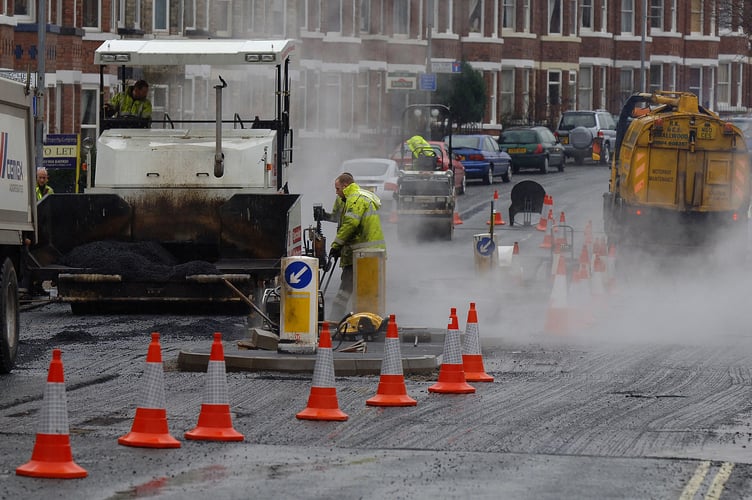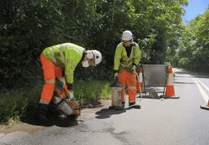Almost 100 miles of Gloucestershire roads were repaired last year, new figures show.
Across England, the total length of roads treated dropped by 45% in 2022-23 compared to five years ago, resulting in 3,366 fewer miles receiving any kind of improvement work.
Meanwhile, the RAC has said pothole-related breakdowns have surged in recent months, reaching a five-year high in the run-up to Christmas.
Department for Transport figures show 98.3 miles of roads in Gloucestershire had improvement work done in the year to March 2023 – up from 93.3 miles five years ago. The maintenance could include strengthening, resurfacing and preservation of roads.
Nationally, 4,144 miles of roads received treatment by local authorities in 2022-23 compared with 7,510 miles in 2017-18.
Of the road network treated, 764 miles of main roads, classified as A roads, were improved and 3,384 of minor roads – a drop of 37% and 46%, respectively.
In Gloucestershire, 18.5 miles of main roads had work done.
RAC head of policy Simon Williams said: “These figures lay bare just how little resurfacing and life-extending preservation work councils have managed to carry out in the last financial year.
“We suspect this means road maintenance in England has reached a new low point – a sorry state of affairs considering how car-dependent the country is.
“It’s especially concerning to see that so few miles of A roads received any form of road maintenance last year when these important routes are used by millions of drivers every day.”
Mr Williams urged local authorities to take a “traffic light” approach to road maintenance.
Roads classified as being in a green or amber condition should undergo preventative maintenance, while those categorised as red “need to be fully resurfaced or strengthened as no amount of preventative treatment will stop them from falling apart”.
In Gloucestershire, 2% of main roads and motorways were categorised as red and 15% fell into the amber category.
In October the Government announced it would provide £8.3 billion of extra funding over 11 years to fix potholes in England, using money saved by scrapping the planned extension of HS2 north of Birmingham.
Mr Williams warned that “isn’t nearly enough for a long-term fix”.
Darren Rodwell, transport spokesperson for the Local Government Association, said councils are working hard to reduce the current £14 billion road repairs backlog.
“This includes investing in cost-effective and resilient resurfacing, so that roads stay in better condition for longer, but this has been hampered by inflation and rising costs of materials,” he added.
“Extra funding promised over the next decade will help and we urge the Government to award council highways departments with five-yearly funding allocations, so they can develop long-term resurfacing programmes and other significant highways improvements.”
A Department for Transport spokesperson said: “Local authorities are responsible for road maintenance, but we are supporting them with the biggest ever increase in funding for local road improvements, with £8.3 billion of reallocated HS2 funding – enough to resurface over 5,000 miles of roads across the country.
“This is on top of more than £5.5 billion already committed to local highways maintenance and will help make journeys smoother and safer for all.”
A Gloucestershire County Council spokesperson said: “We are investing £100 million in our highways transformation work, which includes road resurfacing and pothole filling. We have repaired 50,000 potholes across the county this financial year so far, and will resurface 220 roads - making a real difference for all who use Gloucestershire roads.
“This includes extensive work in the Forest of Dean where we have resurfaced South Road in Broadwell, A417 Redmarley, A48 Tidenham and Park End Road in Bream to improve the condition of these roads. We are also currently resurfacing the A417 at Corse.
“In the Forest of Dean and across the county, we have also been using innovative methods to improve road conditions, including a spray injection patching machine to speed up pothole repairs. Find and Fix teams have also repaired thousands of smaller potholes ahead of schedule before they have got worse. “We also launched Fix My Street, a new, easier and more efficient way for residents, businesses and organisations in Gloucestershire to report and get updates on everything from potholes to problem paths through an interactive online map.”




